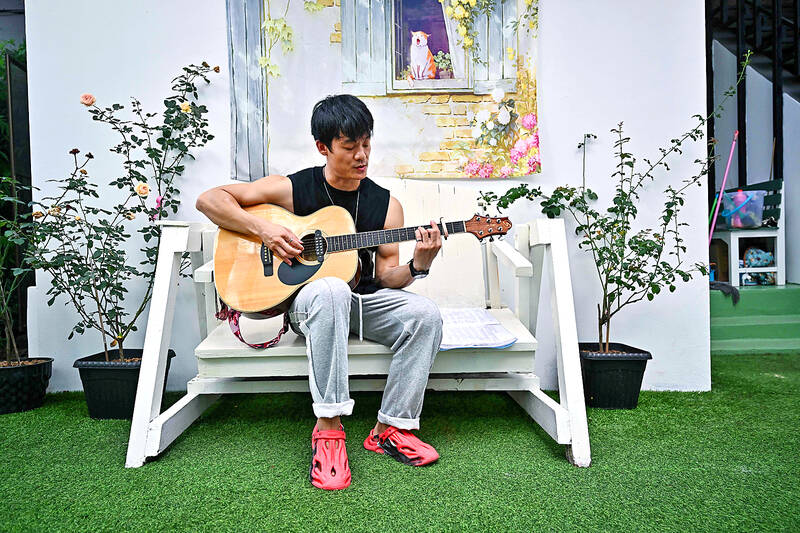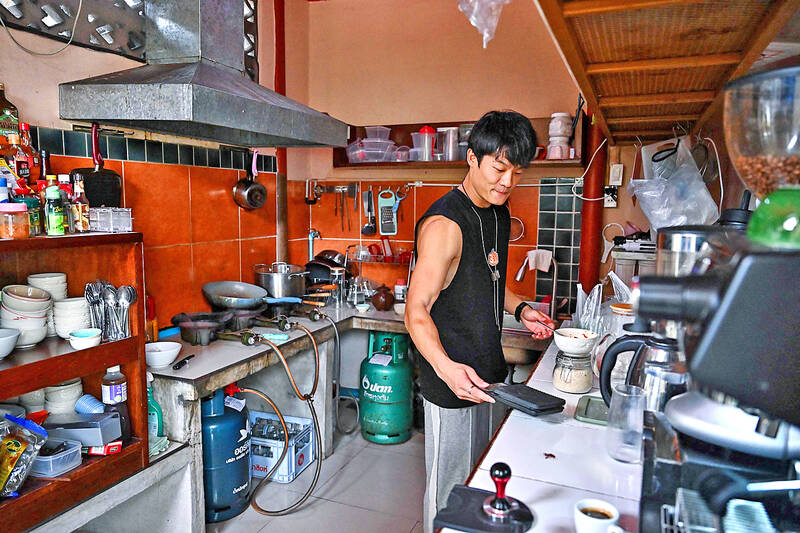Hitting tennis balls across a tree-lined court in Thailand’s mountainous north, Connie Chen’s weekly private training session is a luxury the Chinese national could barely afford when she lived in Shanghai.
China implemented some of the world’s toughest COVID restrictions during the pandemic, putting hundreds of millions of people under prolonged lockdowns. In the aftermath, younger citizens — exhausted by grueling and unrewarding jobs — are taking flight to escape abroad.
With a relatively easy process for one-year study visas, a slower pace of living and cheap living costs, Thailand’s second-largest city Chiang Mai has become a popular destination.

Photo: AFP
“During the pandemic, the desire for freedom became stronger,” said Chen, a 26-year-old former bank worker.
In China’s financial capital Shanghai — hit by some of the strictest pandemic lockdowns — Chen had a stable, well-paid job, but was unhappy with the career path that lay ahead of her.
After the pandemic, Chen knew something had to change.

Photo: AFP
“Even if I kept doing this job for the rest of my life, it would just be like this,” she said.
“But life is so short that I want to try something different.”
Chen is emblematic of many of her generation: unlike their parents who benefited from China’s then-booming economy, younger Chinese are burdened by a weak economy.

Photo: AFP
Prospects for promotion are few and competition is ferocious, leading many to burn out. Chen researched foreign language programs, choosing Thailand where she and her husband, Gordon Lin, moved in May under a one-year education visa.
And now they are determined to live abroad long-term.
“I feel there are a lot of opportunities outside and I feel hope,” she said.
The COVID lockdowns in Shanghai led to rare street protests that quickly escalated into demonstrations across other major cities in China, prompting a crackdown by the nation’s communist rulers.
The people interviewed for this story were reluctant to discuss politics, but all insisted their moves abroad were motivated by wanting a different lifestyle.
DECENT, DIGNIFIED LIFE
The surging desire to leave China can be seen in patterns on WeChat, the Chinese messaging app.
Searches for “emigration” have spiked, hitting 510 million in one day in October, according to Chinese-language media, while in late January “immigrating Thailand” was searched more than 300,000 times in a single day.
Thailand is seen as easier than Europe or North America, with the kingdom offering several types of long-term visas, including a one-year language course — costing roughly US$700 to US$1,800.
“I think there’s a sudden increase of desire for leaving China,” said social anthropologist Xiang Biao, from Germany’s Max Planck Institute for Social Anthropology.
Thailand has come to be regarded by many Chinese as a stepping stone country, he said, ideal to experiment with living abroad.
But compared to migration in the 1990s and 2000s, when many kept connections with China for business, Xiang said there was a new trend of people wanting to totally uproot themselves.
He added while this group were educated they were not necessarily part of the elite or wealthy.
“They are cosmopolitan, open-minded and they cherish a basic sense of freedom — not necessarily political freedom, but they want to live a life that they feel is decent and is dignified,” he said.
And unlike previous generations, they are not seeking to make their fortune abroad.
“It is really thinking of the question of what kind of life they want, what kind of adults they want to become,” he said.
‘JUST DO IT FIRST’
Back at the tennis court in Chiang Mai, Chen’s husband Lin cheers her on.
The former e-commerce employee had planned to work hard, save and then retire early. But he felt increasingly suffocated by the identikit mindset surrounding him.
“It’s all about going to a good university, finding a good job, being a civil servant,” the 32-year-old said.
Chen and Lin have only been in Thailand for a few months, living off savings while they consider their next move.
But for Yin Wenhui it is time to go.
The 31-year-old arrived during the pandemic, stranded after China shut its borders, but after a few months he didn’t want to return to face relentless pressure from family and peers to devote himself utterly to work.
“I feel more free here. The pace was too fast in China, I didn’t have the freedom to do things I wanted to,” he said.
Now instead of obsessing about work he runs a Chiang Mai hostel with friends, goes to the gym daily and has learned to cook. Fulfilling a childhood dream, he was also learning to play the guitar — something his parents frowned upon.“Here I have more time to think, think about what kind of life I want,” he said.
But now the honeymoon is over for him — he has grown frustrated by the slow pace of life and is ready for the next stage.
“I want to go to a developed country, as it will be better than China or Chiang Mai on culture, work and also salary,” he said.

June 2 to June 8 Taiwan’s woodcutters believe that if they see even one speck of red in their cooked rice, no matter how small, an accident is going to happen. Peng Chin-tian (彭錦田) swears that this has proven to be true at every stop during his decades-long career in the logging industry. Along with mining, timber harvesting was once considered the most dangerous profession in Taiwan. Not only were mishaps common during all stages of processing, it was difficult to transport the injured to get medical treatment. Many died during the arduous journey. Peng recounts some of his accidents in

“Why does Taiwan identity decline?”a group of researchers lead by University of Nevada political scientist Austin Wang (王宏恩) asked in a recent paper. After all, it is not difficult to explain the rise in Taiwanese identity after the early 1990s. But no model predicted its decline during the 2016-2018 period, they say. After testing various alternative explanations, Wang et al argue that the fall-off in Taiwanese identity during that period is related to voter hedging based on the performance of the Democratic Progressive Party (DPP). Since the DPP is perceived as the guardian of Taiwan identity, when it performs well,

The Taiwan People’s Party (TPP) on May 18 held a rally in Taichung to mark the anniversary of President William Lai’s (賴清德) inauguration on May 20. The title of the rally could be loosely translated to “May 18 recall fraudulent goods” (518退貨ㄌㄨㄚˋ!). Unlike in English, where the terms are the same, “recall” (退貨) in this context refers to product recalls due to damaged, defective or fraudulent merchandise, not the political recalls (罷免) currently dominating the headlines. I attended the rally to determine if the impression was correct that the TPP under party Chairman Huang Kuo-Chang (黃國昌) had little of a

A short walk beneath the dense Amazon canopy, the forest abruptly opens up. Fallen logs are rotting, the trees grow sparser and the temperature rises in places sunlight hits the ground. This is what 24 years of severe drought looks like in the world’s largest rainforest. But this patch of degraded forest, about the size of a soccer field, is a scientific experiment. Launched in 2000 by Brazilian and British scientists, Esecaflor — short for “Forest Drought Study Project” in Portuguese — set out to simulate a future in which the changing climate could deplete the Amazon of rainfall. It is